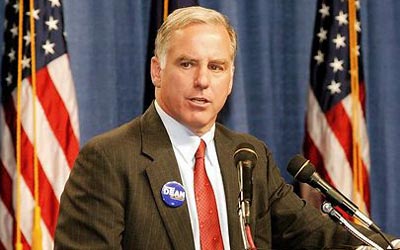Howard Dean: Making the solar system safe for Republicans (and most Democrats)by Taylor Dinerman
|
| Every penny of the Bush tax cut which Dean has promised to repeal would go to pay for a human Mars mission, leaving nothing left over for the other programs that Dean has promised to fund. |
The Mars Society has claimed that a human Mars mission can be done for far less than NASA’s estimated cost. If the project could really be done without regard for the usual political, legal, regulatory, and civil service questions that inevitably plague any government funded effort, they might be right. So, for the sake of argument, let’s say that the US could reach Mars for 250 billion dollars over ten years. That’s 25 billion dollars a year that would be added to NASA current 15 billion dollar a year budget, or half that, if the program were to be stretched out over twenty years. Not even the most pro-NASA advocate has ever considered asking the President or Congress to give the space agency such a huge increase. Senator Barbara Mikulski of Maryland, for example, had asked that three billion dollars be added to the budget, and her request was widely derided.
If Dean is the Democratic candidate, this leaves Bush with some room to propose his own set of goals, which will surely be far less expensive than what Dean has called for. A program to build a permanent base on the moon might cost two or three billion more a year than NASA’s current budget. A reusable launch vehicle (RLV) program could be done for one to two billion dollars a year. The administration’s three to five billion-dollar increase, contrasted with Dean’s 10 to 25 billion-dollar increase, would look politically palatable.
When Bush’s father proposed his Moon and Mars project in 1989, the Democrats responded, “there is no such thing as a free launch.” In those days, there was no Democratic candidate who agreed to a manned Mars program. Today, a return to the Moon program might cost roughly the same as the space station—about 100 billion dollars (calculated from the time Ronald Reagan committed to build one in 1984 until NASA and its partners reach the “core complete” stage.)
The fact is that Dean has given Bush the political “space” to propose any project up to about 200 billion dollars and still be safe from the kind of political budget pressure that doomed his father’s proposal. One can almost hear the GOP talking heads saying, “Sure it’s expensive, but compared with Howard Dean’s half a trillion mission to Mars, this is simply a realistic next step. The technology and resources we acquire doing this will make getting to Mars a lot easier when we decide to go. Anyway, given the fact that the Chinese will probably be building their own moonbase, this is far more important to us right now.”
| Dean has given Bush the political “space” to propose any project up to about 200 billion dollars and still be safe from the kind of political budget pressure that doomed his father’s proposal. |
In effect, the former Vermont governor has made it safe for Bush or for any of Dean’s Democratic rivals to propose realistic increases in NASA’s budget. During a time of rapid economic growth and overall optimism, increasing NASA’s budget by two or three billion a year may be possible. Even a one billion increase would allow the agency some room to begin serious planning for human missions beyond low Earth orbit.
The other big political news this week is the defection of Texas Congressman Ralph Hall from the Democratic Party. A World War Two Navy fighter pilot and a critical supporter of the space program, especially of the biomedical research aspect, Hall had been the senior Democrat on the House Science Committee. He could now be in line for the top spot, assuming a suitable position can be found for New York Congressman Sherwood Boehlert. Alternatively, he could take over the space subcommittee since the current chairman, Dana Rohrabacher, has been eligible to take over an important foreign affairs subcommittee and only stayed in his current job to help NASA recover from the Columbia disaster. In either job, Hall would bring some much-needed Texas clout to the space program.
